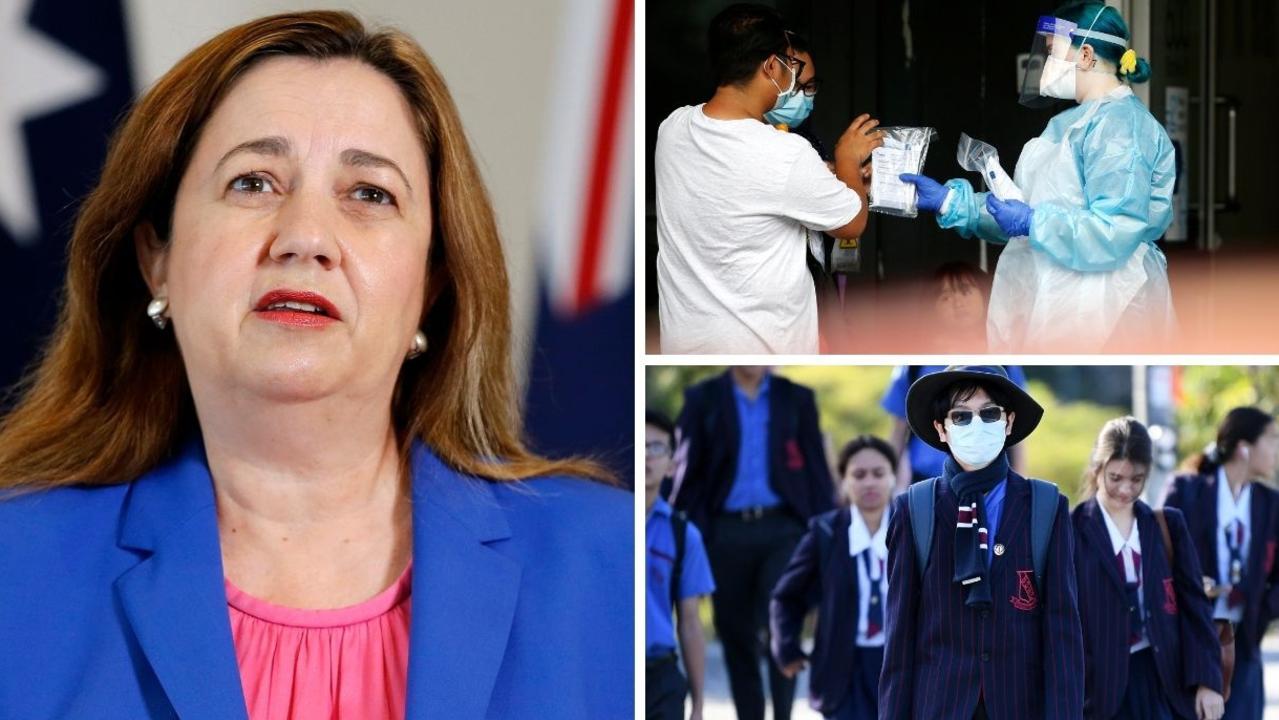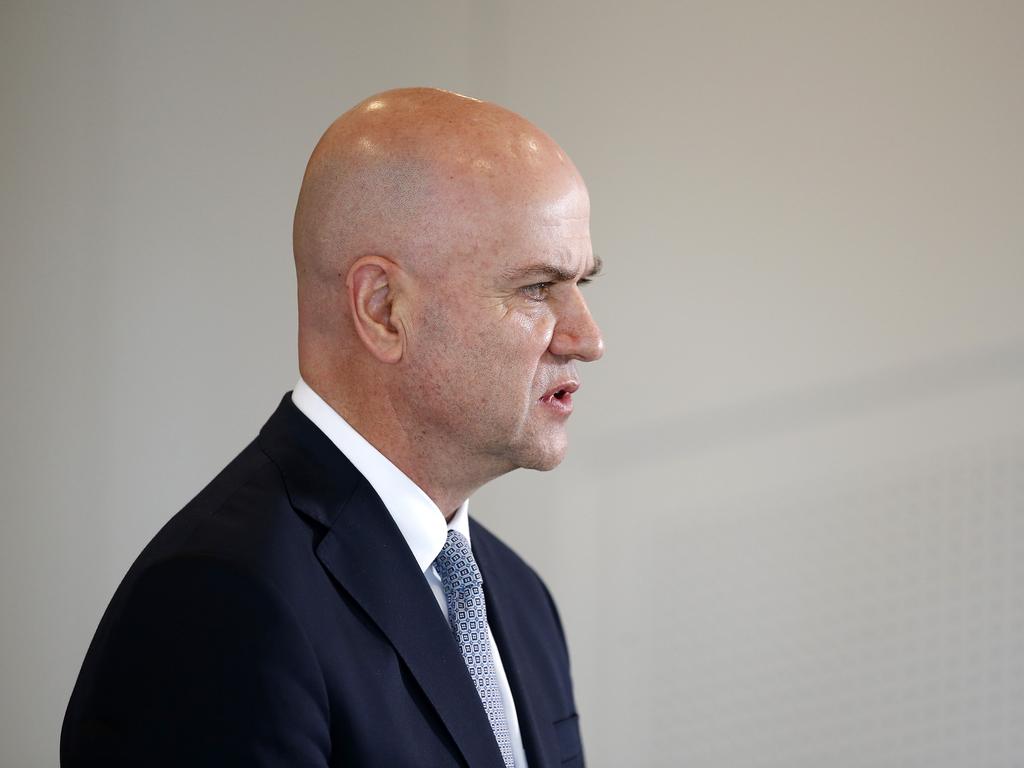Covid Qld: Latest case numbers as Premier reveals return to school could be delayed by one to two weeks amid growing wave
The Premier has warned the return to school could be delayed by up to two weeks and called on Queenslanders to restrict their movements “for the next six weeks” as the number of cases in the state continues to rise, with close to 11,000 recorded overnight.
Premier Annastacia Palaszczuk has warned the return to school could be delayed by one to two weeks and asked Queenslanders to restrict their movements for the next six weeks, saying “January and February is going to be very tough for Queensland”, as 10,953 new cases were recorded overnight.
Fourteen people are in intensive care with the virus, with three people on ventilators.
The Premier said the government “would not be sending primary school children back to school” in the peak of the expected “short, sharp wave”.
She said they were looking at modelling but it was possible return to school would be delayed by one to two weeks.
“This is going to be a short, sharp wave which will challenge the resilience of Queenslanders,” she said.
“It’s important for anyone who has symptoms to stay home and to avoid large indoor crowds especially if you are vulnerable.”

Ms Palaszczuk said the Queensland disaster management group would stand up next week but the peak was “going to happen in such a short amount of time”.
“January and February is going to be very tough for Queensland,” she said.
MAPPED: Every suburb where Covid cases located as infections explode across state
“The vast majority of young people have either got it or have it now because of their socialising.
“Now is not the time to be going out socialising – we are asking you to minimise going out for the next six weeks.”
She said it is “not a big ask” when there are countries who have been locked down for at least a year.
She said a lot of pre-planning had been done for Delta where the peak was expected to happen over six to nine months.
The emergence of Omicron now means the peak will happen a lot sooner and ‘we’ve had to bring forward our planning’.

Chief health officer Dr John Gerrard said the plan is not to stop the spread of this virus, rather “we are just trying to slow it down a little bit” he said.
“We don’t know that there won’t be new strains in the future,” he said.
Dr Gerrard said the “bulk” of Covid-positive people across the state are “younger people”.
“In the demographic of concern – people in their 20s and 30s – the virus is already widespread,” he said.
He said the speed of the omicron strain is “extraordinary”.
“The biggest pressures will be a very substantial number of intermediate patients who will require a relatively short stay in hospital but will not require critical care,” he said.
“There is a clear shift from the very severe to the medium severe type patient that we are going to be seeing.”
He said he believed the high vaccination rates of the population was protecting the community.
“I believe the main reason that we are seeing very few admissions to intensive care units is because we have very high vaccination rates and probably also because the Omicron strain continues to become more dominant,” he said.
“It is now somewhere between 80 and 90 per cent of all virus we are identifying.
“The vaccination rate is almost certainly protecting us.”
Ms Palaszczuk ‘strongly recommended’ people work from home and urged the public to “restrict their movements” until they have had their booster shot.
“We are not going to stop this wave but we can stop people’s movements.”
Dr Gerrard called on Queenslanders to work from home when possible, saying “we know transmission does occur in the work environment”.

He said anyone with a sore throat, cough, runny nose, headache or fever should “assume they have Covid-19 until proven otherwise”.
For those with symptoms, he said treatment options range from taking on fluids to using panadol for a headache, but added “what is most important” is for people to look out for the “symptoms of deterioration.”
“This includes increasing breathlessness, significant chest pain, coughing up blood and if a fever is not getting better 48-72 hours later - beyond three days people should be seeking medical advice,” he said.
Health Minister Yvette D’Ath laid out five measures authorities hoped would help slow the spread:
1. Stay at home if unwell – she said even if someone returned a negative RAT test it is ‘highly possible’ they’ll get a negative on an initial RAT test and then get a positive at a later time
2. Work from home where possible
3. Wear a mask
4. Social distance – ‘we know it makes a difference’
5. Get vaccinated
She said it was important for people to stay home “even if you have a negative result”.
Ms Palaszczuk said 221,000 RAT tests have been deployed to clinics across the state.
“The supply of RAT tests is not just a domestic issue – it’s an international issue,” she said.
She said she supports RATs being made available for people who can’t afford it or are close contacts.
Ms Palaszczuk warned there there’s “absolutely more cases out there” because of at-home RAT tests, which as yet cannot be reported, but she revealed a new hotline will be established to allow people isolating at home to report positive RAT results.
It comes as the strain on testing clinics is reportedly beginning to ease following days of chaos, but the cracks continue to widen inside the state’s struggling healthcare sector.
In one case, a leaked communication from management at a Brisbane hospital revealed the facility is under duress without the support hoped for and minimum staffing levels.
Meanwhile, tensions boiled over into a road rage incident at a Brisbane testing clinic on Thursday, amid claims people were urinating and defecating near businesses and frequenting a cafe despite potentially being infected with the virus.
Ms D’Ath said there are two new government areas that have reported cases in the past 24 hours.
“Hospitals operating between tier 1 and 2 are dealing with staff shortages and bed capacity issues but some hospitals operating on tier 3 also have measures in place to reduce elective surgeries,” she said.
Wait times at Covid testing clinics across Brisbane have begun to subside, but many people have reported still being stuck in hours-long queues.





